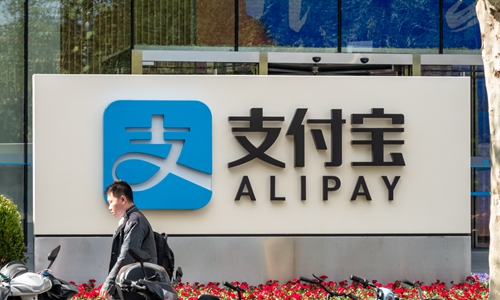HOME >> SOURCE
Health code software brings convenience, but privacy should be respected: experts
By Zhang Dan Source:Global Times Published: 2020/3/2 22:02:23

A passenger walks by an Alipay building in the Lujiazui financial center in Shanghai on Wednesday. Alipay, Alibaba's online payment platform, spent more than 2.2 billion yuan ($313 million) to purchase the building, which covers 48,000 square meters. Hangzhou-based Alipay set up a subsidiary in Shanghai in 2008 and officially settled in the city in 2015. Photo: IC
China has become a proving ground for how digital technology and big data facilitate resumption of work by a massive population amid the country's continuing fight against the coronavirus.Health code software, developed by domestic internet giants, is widely used in the country as a way to demonstrate the quarantine status of people returning to work or from their homes.
In the special period of battling with the virus, experts and lawyers said that citizens' privacy should not give way or be abused when private databases are put into use for epidemic prevention and control.
Internet companies Ant Financial under Alibaba, as well as Tencent, both developed such software to generate a QR code to tell whether the user should be quarantined or not.
After inputting personal details into the software, a QR health code will be generated in green, yellow or red. Residents with a green code can move freely. Yellow requires 7-day quarantine, and red requires 14-day quarantine according to the software on Alipay, a popular wallet app by Ant Financial.
"The health QR code has greatly relieved our stress in the examination of people's quarantine status," Hu Xiuyun, deputy chairperson of a neighborhood committee in Beijing's outlying Shunyi district, told the Global Times on Monday.
Before using the software, 10 workers in the committee called all the local residents to ask about their schedules to return to Beijing or their movements within Beijing. "Now, we don't need to bother those who haven't been back to the city as we can check their activities online according to the feedback of their health codes," Hu noted, saying the software had increased community administrators' working efficiency greatly.
Between February 24 and Monday, more than 200 cities had adopted the Alipay Health Code, including the big cities of Shanghai and Chongqing, and provinces of East China's Zhejiang, Southwest China's Sichuan and North China's Shanxi, Ant Financial told the Global Times.
On Saturday, the platform of national e-governance launched the health code software, backed by Tencent Cloud technology. The software has covered a population of 700 million and more than 500 million codes have been generated, the Economic Daily said.
However, while citizens and local administrators enjoy the convenience of the mature data application, some raised concerns on users' privacy protection, worrying information especially related to health may be abused one day.
According to Hu Wei, a lawyer at Beijing-based Globe-Law law firm, the priority for internet companies is to "follow the principle of legitimacy and necessity" when collecting and using personal' information, no matter it is a time for epidemic control and prevention or not.
"The software must inform users about how and to what extent it will use the data and the purpose for collecting the data," Hu noted, adding the core issue lies on the self-restraint of internet companies and the sophisticated legal framework of data collection.
He Lingnan, deputy chief of the big data and communications lab at Sun Yat-sen University in South China's Guangdong Province, told the Global Times that most of the Chinese internet giants are good at dealing with core data and sensitive data.
"So far, we haven't seen large-scale privacy leaks in big internet companies in China. Not like Facebook," he said.
In Beijing, the data collected by the app is stored by the local government and will only be used for epidemic control and prevention purposes, local official said on Sunday's press conference. Once the aging time of the code passed, relevant data will lose efficacy, the official said.
Cities nationwide are striving to break through barriers among codes across different cities. As of Sunday, health codes generated in Central China's Henan and Hunan Provinces and Sichuan Province had been recognized by Zhejiang Province as legal health certificates for workers to resume work.
RELATED ARTICLES:
Posted in: INDUSTRIES